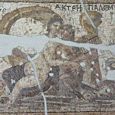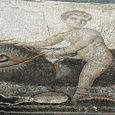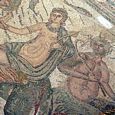PALAIMON
Greek Name
Παλαιμον
Transliteration
Palaimon, Palaemon
Roman Name
Portunus
Translation
Wrestler (palaimon)
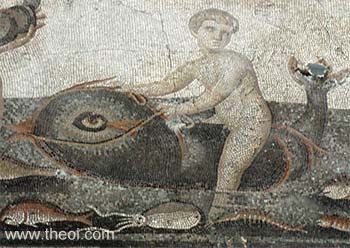
PALAIMON (Palaemon) was a child sea-god who, with his mother Leukothea (Leucothea), came to the aid of sailors in distress .
He was originally a mortal boy named Melikertes (Melicertes) whose parents incurred the wrath of Hera for fostering the young god Dionysos. His father was driven into a murderous rage by the goddess and Ino fled with Melikertes in her arms, leaping off the cliffs into the sea. The pair were transformed into sea-gods and renamed Palaimon and Leukothea.
Palaimon was depicted in Greco-Roman mosaic as either a dolphin-riding boy or a fish-tailed child Triton.
The name Melikertes was derived from that of the Phoenician god Melkart or Melqart. However the Greeks re-interpreted this name to mean "the honey-eater." The Romans identified Palaimon with Portunus their god "of the harbour."
FAMILY OF PALAEMON
PARENTS
[1.1] ATHAMAS & INO (Apollodorus 1.80 & 3.28,
Hyginus Fabulae 1 & 239, Ovid Metamorphoses 4.542, Nonnus Dionysiaca 5.556)
[1.2] INO (Pausanias 1.44.7, Philostratus Elder
2.16, Virgil Georgics 1.432, Cicero De Natura Deorum 3.15)
ENCYCLOPEDIA
PALAEMON (Palaimôn), signifies the wrestler. A son of Athamas and Ino, was originally called Melicertes.
When his mother, who was driven mad by Hera, had thrown herself with her boy, who was either still alive or
already killed, from the Molurian rock into the sea, both became marine divinities, viz. Ino became Leucothea,
and Melicertes became Palaemon. (Apollod. iii. 4. § 3; Hygin. Fab. 2; Ov. Met. iv. 520,
xiii. 919.) According to some, Melicertes after his apotheosis was; called Glaucus (Athen. vii. p. 296),
whereas, according to another version, Glaucus is said to have leaped into the sea from his love of Melicertes.
(Athen. vii. p. 297.) The apotheosis was effected by the Nereides, who saved Melicertes, and also ordered the
institution of the Nemean games. The body of Melicertes, according to the common tradition, was washed by the
waves, or carried by dolphins into port Schoenus on the Corinthian isthmus, or to that spot on the coast
wheresubsequently the altar of Palaemon stood. (Paus. i. 44. § 11, ii. 1. § 3; Plut. Sympos.
v. 3.) There the body was found by his uncle Sisyphus, who ordered it to be carried by Donacinus and Amphimachus
to Corinth, and on the command of the Nereides instituted the Isthmian games and sacrifices of black bulls in
honour of the deified Palaemon. (Tzetz. ad Lyc. 107, 229; Philostr. Her. 19, Icon.
ii. 16; Paus. ii. 1. § 3; Schol. ad Eurip. Med. 1274; Eurip. Iph. Taur. 251.) On the
isthmus of Corinth there was a temple of Palaemon with statues of Palaemon, Leucothea, and Poseidon; and near
the same place was a subterraneous sanctuary, which was believed to contain the remains of Palaemon. (Paus. ii.
2. § 1.) In the island of Tenedos, it is said that children were sacrificed to him, and the whole worship
seems to have had something gloomy and orgiastic about it. (Philostr. l. c.; Hom. Od. iii. 6.) In works
of art Palaemon is represented as a boy carried by marine deities or dolphins. (Philostr. Icon. ii.
16.) The Romans identified Palaemon with their own god Portunus, or Portumnus.
Melicertes (Melikertês), a son of Athamas and Ino, was metamorphosed into a marine divinity, under the
name of Palaemon. (Apollod. i. 9. § 5.)
Inous, that is, the son of Ino, a name given to Melicertes and Palaemon. (Virg. Aen. v. 823,
Georg. i. 437.)
Source: Dictionary of Greek and Roman Biography and Mythology.
ALTERNATES NAMES
Greek Name
Μελικερτης
Transliteration
Melikertês
Latin Spelling
Melicertes
Translation
Honey-Eater (meli-,)
CLASSICAL LITERATURE QUOTES
DEATH & APOTHEOSIS OF MELICERTES
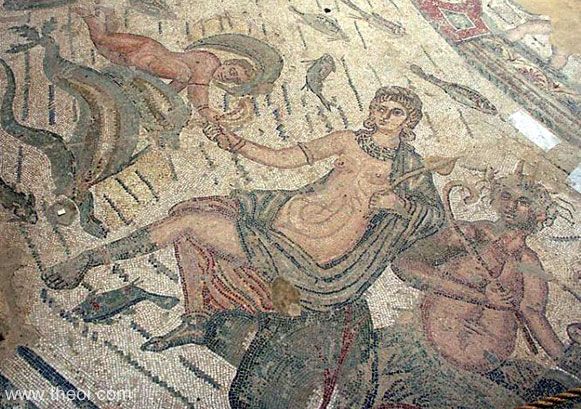
Aeschylus, Athamas (lost play) (Greek tragedy C5th B.C.) :
Aeschylus' lost play Athamas told the story of the madness of Athamas and the flight of Ino with
her son Melikertes (Melicertes).
Pseudo-Apollodorus, Bibliotheca 1. 80 (trans. Aldrich) (Greek mythographer C2nd A.D.)
:
"Athamas, lord of Boiotia (Boeotia), sired by Nephele a son Phrixos (Phrixus) and a daughter Helle. Then he
took a second wife, Ino, by whom he had Learkhos (Learchus) and Melikertes (Melicertes)."
Pseudo-Apollodorus, Bibliotheca 3. 28 :
"Hermes took him [the infant Dionysos] to Ino and Athamas, and persuaded them to bring him up as a girl.
Incensed, Hera inflicted madness on them, so that Athamas stalked and slew his elder son Learkhos (Learchus) on
the conviction that he was a deer, while Ino threw Melikertes (Melicertes) into a basin of boiling water, and
then, carrying both the basin and the corpse of the boy, she jumped to the bottom of the sea. Now she is called
Leukothea (Leucothea), and her son is Palaimon (Palaemon): these names they receive from those who sail, for
they help sailors beset by storms. Also, the Isthmian games were established by Sisyphos (Sisyphus) in honor of
Melikertes."
Pausanias, Description of Greece 1. 44. 7 (trans. Jones) (Greek travelogue C2nd A.D.)
:
"There are legends about these rocks [the Molourian Rocks on the coast of Megara] . . . it is said that
from it Ino flung herself into the sea with Melikertes (Melicertes), the younger of his children . . . Then it
was that she fled to the sea and cast herself and her son from the Molourian Rock. The son, they say, was landed
on the Korinthian Isthmos (Corinthian Isthmus) by a dolphin, and honours were offered to Melikertes, then
renamed Palaimon (Palaemon), including celebration of the Isthmian games. The Molurian Rock they though sacred
to Leukothea and Palaimon."
Callistratus, Descriptions 14 (trans. Fairbanks) (Greek rhetorician C4th A.D.)
:
"[A description of an ancient Greek painting :] Athamas goaded on by madness, was shown as naked, his hair
reddened with blood and its locks flying in the wind. . . Ino too was present, in a state of terror, trembling
slightly, her face place and corpse-like though fright; and she embraced her infant child [Melikertes
(Melicertes)] and held her breast to its lips, letting the nurturing drops fall on the nursling. The figure of
Ino was hastening towards the promontory of Skeiron (Sciron) and the sea at the foot of the mountain, and the
breakers that were wont to surge in billows were spreading out in a hollow to receive her . . . And sea-dolphins
were sporting near by, coursing through the waves in the painting . . . Moreover, at the outer edges of the
painting an Amphitrite rose from the depths, a creature of savage and terrifying aspect who flashed from her
eyes a bright radiance."
Pseudo-Hyginus, Fabulae 1 (trans. Grant) (Roman mythographer C2nd A.D.) :
"Athamas, son of Aeolus, had by his wife Nebula [Nephele], a son Phrixus and a daughter Helle . . . and by
Ino, daughter of Cadmus, two sons, Learchus and Melicertes."
Pseudo-Hyginus, Fabulae 2 :
"Athamas, driven mad by Jove [Zeus], slew his son Learchus. But Ino, with Melicertes her son, threw herself
into the sea. Liber [Dionysos] would have her called Leucothea, and Melicertes, her son the god Palaemon, but we
call her Mater Matuta, and him Portunus. In his honor every fifth year gymnastic contests are held, which are
called Isthmian."
Pseudo-Hyginus, Fabulae 4 :
"Ino with the younger [son of her and Athamas], Melicertes, cast herself into the sea and was made a
goddess."
Pseudo-Hyginus, Fabulae 243 :
"Ino, daughter of Cadmus, hurled herself into the sea with her son, Melicertes."
Pseudo-Hyginus, Fabulae 224 :
"Mortals who were made immortal . . . Ino, daughter of Cadmus, into Leucothea, whom we call Mater Matuta;
Melicertes, son of Athamas, into the god Palaemon."
Pseudo-Hyginus, Fabulae 239 :
"Ino, daughter of Cadmus, killed her son Melicertes by Athamas, son of Aeolus, when she was fleeing from
Athamas."
Ovid, Metamorphoses 4. 542 ff (trans. Melville) (Roman epic C1st B.C. to C1st A.D.)
:
"[Athamas was driven mad by the goddess Hera when she discovered he had fostered the godling Dionysos.
First snatched up his young son Learkhos (Learchus) and threw the boy into a pot of boiling water :]
Then his [Learkhos' (Learchus')] mother [Ino], crazed by grief or by the sprinkled poison's power [the curse of
Hera], screamed madly and with streaming hair rushed out with tiny Melicertes in her arms, and shouted
‘Bacchus! Bacchus!’; at the name of Bacchus Juno [Hera] smiled, ‘Well done, the brat you
fostered, to bestow a boon like that!’
A cliff hung by the shore; the bottom part was hollowed by the waves and formed a roof to shield the waters from
the storms; the top stood hard and high and faced the open sea. Here Ino climbed--her madness gave her
strength--and with her burden launched herself, unchecked by any thought of fear, out and away, and where she
fell the waves were white with spray.
But Venus [Aphrodite], pitying her grandchild's [Ino's] woes, so undeserved, addressed with winning words her
uncle: ‘Lord of waters, whose power yields to heaven alone, great Neptunus [Poseidon], what I ask is much
indeed, but pity those I love, now tossing in the vast Ionian sea, and make them gods to join your company . .
.’
Her prayer was granted. Neptunus removed their mortal essences, clothed them in majesty and awe, and changed
features and names alike, the boy to be Palaemon, and his mother Leucothoe."
Seneca, Oedipus 444 ff (trans. Miller) (Roman tragedy C1st A.D.) :
"Cadmean Ino, foster-mother of shining Bacchus [Dionysos], holds the realms of the deep, encircled by bands
of Nereides dancing; over the waves of the mighty deep a boy holds sway, new come, the kinsman of Bacchus, no
common god, Palaemon."
Statius, Thebaid 1. 12 ff (trans. Mozley) (Roman epic C1st A.D.) :
"With Palaemon in her arms his mother [Ino] quailed not to leap into the vast Ionian Sea."
Statius, Thebaid 9. 401 ff :
"So did Leucothea, not yet a Nereid, wail in Isthmus' haven, when her cold babe [Melikertes (Melicertes)]
with gasping breast spewed out upon his mother the angry sea."
Statius, Silvae 2. 1. 180 ff (trans. Mozley) (Roman poetry C1st A.D.) :
"An innocent child . . . was Palaemon, when his mother [Ino] flung her self on him as he lay shipwrecked
and cast up from the sea in the Isthmian haven."
Nonnus, Dionysiaca 5. 556 ff (trans. Rouse) (Greek epic C5th A.D.) :
"She [Ino] bore Learkhos (Learchus) destined to woe, and Melikertes (Melicertes). She was afterwards to
find a home in the sea, as cherishing nurse for the childhood of Bromios [Dionysos]: to both she gave one common
breast, Palaimon (Palaemon) and Dionysos."
Nonnus, Dionysiaca 10.67
"[Athamas was driven mad by the goddess Hera when she learned he had fostered the godling Dionysos :]
In the hall he [Athamas] espied little Melikertes (Melicertes) [his son] who had just been brought in, and
setting a cauldron over the hearth, a steaming cauldron, he laid his son in it: the fire blazed up, the
murderous cauldron bubbled with boiling water.
His son called out for ‘papa!’ but none of the servants could help. Ino his mother came in like a
stormwind, and snatched him from the cauldron parboiled and half-consumed. Then she ran out bounding with
wild-roaming feet swift as the wind; she traversed the dust of the White Plain, and for that reason she was
named after it Leukothea (Leucothea), the White Goddess.
Athamas mad was out of the hall, stirring his knees like the wind and pursuing Ino over the hills in vain,--she
was too quick for him.
But when the raving husband with restless staggering foot caught her up, at that moment the unhappy woman had
halted by the sea which washed her foot, moaning in plaintive tones over her crying child, while she upbraided
Kronion (Cronion) [Zeus] and Maia's son [Hermes] his messenger : ‘A fine reward you have given me,
Flash-thunderbolt, for the care of Bakkhos (Bacchus)! See this boy, Lyaios' (Lyaeus') agemate, half burnt to
death! If it please you, strike down with your merciless bolt mother and son together, the little one I nursed
in one bosom with you're your divine Dionysos! Child, Necessity is a great god!--where will you flee? What
mountain will receive you, now you have fled to the sea? What Kithairon (Mount Cithaeron) will hide you in a
dark hollow? What mortal man will pity you, when your father has no mercy? Either sword or water shall receive
you: if needs must, better to perish in the sea than by the sword . . . O that Poseidon, the hospitable friend
of Glaukos (Glaucus), might save you, pitying your Ino as once he pitied Phoibos (Phoebus) [Apollon]! I fear
that after the fate of unburied Learkhos (Learchus) I may see you also dead, unburied, unwept, undone, panting
under the bloody knife of your father. Make haste! escape from mad Athamas, and then you will not see the father
who murdered his child, murder the mother. Receive me you too, O sea! I have done with earth. Receive Melikertes
also with hospitable hand, O Nereus, as you received Perseus! . . .’
She spoke, and with trembling feet sprang into the sea, swiftly diving with her son. Seabluehair [Poseidon]
opened his arms to receive Leukothea (Leucothea), and took her into the divine company in the deep waters. She
helps ever since the seamen who lose their way, and now she is Ino of the sea, a Nereis (Nereid) who has charge
of untumultuous calm."
PALAEMON THE SEA-GOD
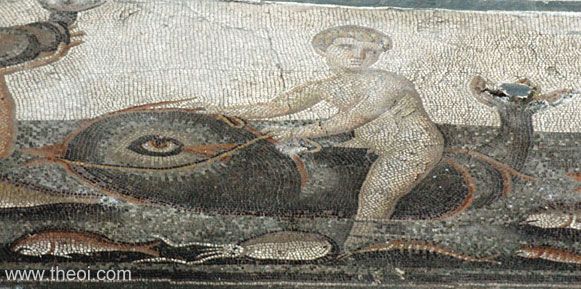
Pseudo-Apollodorus, Bibliotheca 3. 28 (trans. Aldrich) (Greek mythographer C2nd A.D.)
:
"She [Ino] is called Leukothea (Leucothea), and her son is Palaimon (Palaemon): these names they receive
from those who sail, for they help sailors beset by storms."
Philostratus the Elder, Imagines 1. 19 (trans. Fairbanks) (Greek rhetorician C3rd
A.D.) :
"[From a description of an ancient Greek painting depicting the transformation of the Tyrrhenian pirates
into dolphins :] Dionysos on the prow of his ship laughs at the scene and shouts orders to the Tyrrhenians as
fishes in shape instead of men, and as good in character instead of bad. Soon, at any rate, Palaimon (Palaemon)
will ride on a dolphin's back, not awake, but lying prone upon it sound asleep."
Philostratus the Elder, Imagines 2. 16 :
"[Ostensibly a description of an ancient Greek painting at Neapolis (Naples):] Palaimon (Palaemon). The
people sacrificing at the Isthmos (Isthmus), they would be the people of Korinthos (Corinth); and yonder king of
the people, let us consider him to be Sisyphos (Sisyphus); and this precinct of Poseidon gently resounding to
the murmur of the sea--for the foliage of the pines makes this music--all this, my boy, indicates the following:
Ino throwing herself from the land for her part becomes Leukothea (Leucothea) and one of the band of the
Nereides, while as for the child, the earth will claim the infant Palaimon. Already the child is putting in
towards shore on a dolphin obedient to his will, and the dolphin making its back level bears the sleeping child,
slipping noiselessly through the calm water so as not to disturb his sleep. And as he approaches, a sanctuary
opens in the Isthmos as the earth is split apart by Poseidon, who, I fancy, announces to Sisyphos here the
advent of the child and bids him offer sacrifice to him. Sisyphos is sacrificing yonder black bull which he has
no doubt taken from the herd of Poseidon. The meaning of the sacrifice, the garb worn by those who conducted it,
the offerings, my boy, and the use o the knife must be reserved for the mysterious rites of Palaimon--for the
doctrine is holy and altogether secret, inasmuch as Sisyphos the wise first hallowed it; for that he is a wise
man is shown at once, methinks, by the intent look on his face.
And as for the face of Poseidon . . . since he is receiving Melikertes (Melicertes) as his guest in order that
he may keep him on land, he smiles as the child makes harbour, and bids the Isthmos spread out its bosom and
become the home of Melikertes. The Isthmos (Isthmus), my boy, is painted in the form of divinity reclining at
full length upon the ground, and it has been appointed by nature to lie between the Aegean and the Adriatic as
though it were a yoke laid upon the two seas. On the right it has a youth, surely the town of Lekhaion
(Lechaeum) [the port of Corinth], and on the left are girls; these are the two seas (thalattai), fair
and quite calm, which lie alongside the land that represents the Isthmos."
Orphic Hymn 75 to Palaemon (trans. Taylor) (Greek hymns C3rd B.C. to 2nd A.D.)
:
"To Palaimon (Palaemon), Fumigation from Manna. O nursed with Dionysos, doomed to keep thy dwelling in the
widely spreading deep; with joyful aspect to my prayer incline, propitious come, and bless the rites divine; thy
mystics through the earth and sea attend, and from old sea's stormy waves defend: for ships their safety ever
owe to thee, who wanderest with them through the raging sea. Come, guardian power, whom mortal tribes desire,
and far avert the deep's destructive ire."
Ovid, Metamorphoses 11. 918 ff (trans. Melville) (Roman epic C1st B.C. to C1st A.D.)
:
"She [Skylla (Scylla)] gazed in wonder at his [the sea-god Glaukos' (Glaucus')] colour and his hair that
clothed his shoulders and streamed down his back, and thighs that formed a twisting fish's tail . . . [and] he
said, ‘. . . I am a Sea-God (deus aquae). Over the open sea not Proteus, no, nor Triton nor
Palaemon Athamantiades (son of Athamas) has greater power than I.’"
Ovid, Heroides 18. 159 ff (trans. Showerman) (Roman poetry C1st B.C. to C1st A.D.)
:
"[Leandros (Leander) who had swam the Hellespont speaks :] ‘I could surpass the young Palaemon in my
swimming, and him whom the wondrous herb made suddenly a god [i.e. Glaukos (Glaucus)].’"
Virgil, Georgics 1. 432 ff (trans. Fairclough) (Roman bucolic C1st B.C.) :
"If at her [the moon's] fourth rising she pass through the sky clear and with undimmed horns, then all that
day, and the days born of it to the month's end, shall be free from rain and wind; and the sailors, safe in
port, shall pay their vows on the shore to Glaucus, and to Panopea, and to Melicerta [Palaimon], Ino's
son."
Statius, Thebaid 1. 120 ff (trans. Mozley) (Roman epic C1st A.D.) :
"[The] Isthmos scarce withstood the waves on either side. With her own hand his mother [Leukothea
(Leucothea)] snatched Palaemon from the curved back of his straying dolphin steed and pressed him to her
bosom."
Statius, Thebaid 9. 328 ff :
"Palaemon, when he hastes back to his darling mother's [Leukothea's (Leucothea's)] kisses, smites his tardy
dolphin."
Statius, Silvae 3. 2. 1 (trans. Mozley) (Roman poetry C1st A.D.) :
"But above all others thou, Palaemon, with the goddess mother [Leukothea (Leucothea)], be favourable [on
this sea-voyage], if 'tis thy desire that I [the poet Statius] should tell of thine own Thebes, and sing of
Amphion, bard of Phoebus, with no unworthy quill."
Apuleius, The Golden Ass 4. 31 ff (trans. Walsh) (Roman novel C2nd A.D.) :
"Shaggy Portunus [Roman Palaimon] sporting his blue-green beard . . . and Palaemon, the little charioteer
on his dolphin."
Nonnus, Dionysiaca 9. 59 ff (trans. Rouse) (Greek epic C5th A.D.) :
"The god [Hermes[ spoke to her [Ino] in friendly coaxing tones, and let pass a divine message from his
prophetic throat: ‘. . . You shall ever live with Melikertes (Melicertes) your immortal son as Leukothea
(Leucothea), holding the key of calm waters, mistress of good voyage next to Aiolos (Aeolus). The merchant
seaman trusting in you shall have a fineweather voyage over the brine; he shall set up one altar for the
Earthshaker and Melikertes, and do sacrifice to both together; Seabluehair shall accept Palaimon (Palaemon) as
guide for his coach of the sea.’"
Nonnus, Dionysiaca 20. 350 ff :
"[The Thrakian king Lykourgos (Lycurgus) drove Dionysos to seek refuge in the sea :] Lykourgos indignant
shouted aloud to the water--‘I wish my father [Ares] had taught me not war alone, but how to deal with the
sea! . . . But since I have not learnt the work of seafaring fishers, and know nothing of the tricks of hunting
in the deep with a cunning mesh of nets, you may have Leukothea's (Leucothea's) house in the watery deep, until
I can dislodge both you and Melikertes (Melicertes) as they call him, another of your kin . . . Ho Fishermen!
Searchers of the haunts of Nereus! Spread not your nets for the denizens of the deep, but haul out Dionysos in
the meshes! Let Leukothea be caught along with Lyaios (Lyaeus) [Diinysos], and let her come back to the land;
let bold Palaimon (Palaemon) come with them to my house, let him dry his body an be slave to Lykourgos! Then he
[Palaimon, the manger of Poseidon,] may leave the courses of his seabred horses round Ephyreia, and yoke my car
beside a terrestrial manger, he and Bakkhos (Bacchus) grooms together. Let there be one house--one house for
both, Palaimon and Dionysos.’
Thus full of fury he railed at the sea, and hoary Nereus, and wished to flog the deep."
Nonnus, Dionysiaca 21. 170 ff :
"In the Erythraian Sea [the Red Sea], the daughters of Nereus [Nereides] cherished Dionysos [driven to
refuge in the sea by Lykourgos (Lycurgus)] at their table, in their halls deep down under the waves. Mermaid Ino
threw off her jealousy of Semele's bed divine, and struck up a brave hymn for winepouring Lyaios (Lyaeus)
[Dionysos]. Ino the nurse of Dionysos made music; and Melikertes (Melicertes) his foster-brother ladled out
nectar from the bowl, and poured the sweet cups for his agemate. So he remained in the hall deep down in the
waves under the waters, and he lay sprawled among the seaweed in Thetis' bosom; he embraced never satisfied
Kadmos' (Cadmus') daughter, Ino his nurse, mother of a noble son, sister of his own mother, and often he held in
the loving prison of his arms Palaimon (Palaemon) his yearsmate, his foster-brother."
Nonnus, Dionysiaca 43. 81 ff :
"[When Poseidon led the sea-gods into battle against Dionysos and his allies during the Indian War,
Dionysos threatened :] ‘Bring that charioteer of the sea [Palaimon the charioteer of Poseidon] from the
depths of the Isthmian brine to be a servant for Mother Rheia and to guide her lions with his whip, for I will
no longer leave my cousin in the deep.’"
Nonnus, Dionysiaca 43. 192 ff :
"[When Poseidon led the sea-gods into battle against Dionysos and his allies :] The army of the brine took
up their wet shields. Under the water beside the brinesoaked manger of Kronion (Cronion) [Poseidon], Melikertes
(Melicertes) shook the spear of the deep, and yoked the Isthmian team; he slung to the side the seaborne car the
spear of the seafaring king, and scored the back of the water with its triple prong--he yoked the Isthmian team,
and the roar of Indian lions resounded along with the neighing of horses.
He drove his watery course; as the car sped, the hoof unwetted, unmoistened, scored only the surface."
Nonnus, Dionysiaca 43. 286 ff :
"[When Poseidon led the Sea-Gods into battle against Dionysos and his allies :] Melikertes (Melicertes)
lunging at Dionysos with his trident of the sea went madly along in leaps like his mother's . . . Companies of
Bassarides marched to battle . . . A Seilenos (Silenus) tore off a roof from a rocky hole and attacked Palaimon
(Palaemon), and drove Ino wandering through the water with his ivy spear."
Nonnus, Dionysiaca 47. 356 ff :
"[Ariadne curses the sailor who carried Theseus away from her, abandoning her on Naxos :] ‘If he
rides the raging storm, may Melikertes (Melicertes) never look on him graciously or bring him a clam sea; but
may Notos (the South Wind) blow when he wants Boreas (the North Wind), may he see Euros (the East Wind) when he
needs Zephyros (the West Wind).’"
Nonnus, Dionyiaca 48. 188 ff :
"[The bridal of Dionysos and Pallene in Thrake (Thrace) :] That was a wedding of many songs : . . .
Companies of Nereides under the foothills of the neighbouring isthmus encircled Dionyoss with wedding dances and
warbled their lay . . . Melikertes (Melicertes) crowned the seagirt wedding-reef of the isthmus chanting Euoi
for Pallene's bridal."
CULT OF PALAIMON
I. MEGARA Town in Attica (Southern Greece)
Pausanias, Description of Greece 1. 44. 7 (trans. Jones) (Greek travelogue C2nd A.D.)
:
"There are legends about these rocks [the Molourian (Molurian) Rocks on the coast of Megara] . . . it is
said that from it Ino flung herself into the sea with Melikertes (Melicerets), the younger of his children . . .
honours were offered to Melikertes, then renamed Palaimon (Palaemon) . . . The Molourian Rock they thought
sacred to Leukothea and Palaimon."
II. CORINTH (KORINTHOS) Chief Town of the Isthmos (Southern Greece)
Pseudo-Apollodorus, Bibliotheca 3. 28 (trans. Aldrich) (Greek mythographer C2nd A.D.)
:
"The Isthmian games were established by Sisyphos in honor of Melikertes (Melicertes)."
Pausanias, Description of Greece 1. 44. 7 (trans. Jones) (Greek travelogue C2nd A.D.)
:
"[Melikertes (Melicertes)], they say, was landed on the Korinthian Isthmos (Corinthian Isthmus) by a
dolphin, and honours were offered to Melikertes, then renamed Palaimon (Palaemon), including celebration of the
Isthmian games."
Pausanias, Description of Greece 2. 1. 2 :
"Farther on [past Krommyon (Crommyon) in Korinthia (Corinthia)] the pine still grew by the shore at the
first time of my visit, and there was an altar of Melikertes (Melicertes). At this place, they say, the boy was
brought ashore by a dolphin; Sisyphos found him lying and gave him burial on the Isthmos (Isthmus), establishing
the Isthmian games in his honour."
Pausanias, Description of Greece 2. 1. 7 - 9 & 2. 2. 1:
"[In the temple of Poseidon at Korinthos (Corinth) :] On the car [of the chariot] stand [statues of]
Amphitrite and Poseidon and there the boy Palaimon (Palaemon) upright upon a dolphin. These too are made of
ivory and gold . . . The other offerings are images of Galene (Calm) and of Thalassa, a horse like a whale from
the breast onwards [i.e. a hippokampos], Ino and Bellerophontes, and the horse Pegasos . . . Within the
enclosure is on the left a temple of Palaimon, with images in it of Poseidon, Leukothea (Leucothea) and Palaimon
himself. There is also what is called his Holy of Holies, and an underground descent to it, where they say that
Palaimon is concealed. Whosoever, whether Korinthian or stranger, swears falsely here, can by no means escape
from his oath."
Pausanias, Description of Greece 2. 1. 4 :
"After the image of Hermes [on the road from Korinthos (Corinth) to the port of Lekhaion (Lechaeum)] come
[statues of] Poseidon, Leukothea (Leucothea), and Palaimon (Palaemon) on a dolphin."
Plutarch, Life of Theseus 25. 4 (trans. Perrin) (Greek historian C1st to C2nd A.D.)
:
"He [Theseus] also instituted the games here [at Korinthos (Corinth)] . . . so by his own appointment they
should celebrate Isthmian games in honor of Poseidon. For the games already instituted there in honor of
Melikertes (Melicertes) were celebrated in the night, and had the form of a religious rite rather than of a
spectacle and public assembly."
Philostratus the Elder, Imagines 2. 16 (trans. Fairbanks) (Greek rhetorician C3rd
A.D.) :
"[A description of the founding of the cult of Palaimon at Korinthos (Corinth) :] As he [Palaimon]
approaches, a sanctuary opens in the Isthmos as the earth is split apart by Poseidon, who, I fancy, announces to
Sisyphos (Sisyphus) here the advent of the child and bids him offer sacrifice to him. Sisyphos is sacrificing
yonder black bull which he has no doubt taken from the herd of Poseidon. The meaning of the sacrifice, the garb
worn by those who conducted it, the offerings, my boy, and the use o the knife must be reserved for the
mysterious rites of Palaimon (Palaemon)--for the doctrine is holy and altogether secret, inasmuch as Sisyphos
the wise first hallowed it."
Pseudo-Hyginus, Fabulae 2 (trans. Grant) (Roman mythographer C2nd A.D.) :
"Melicertes, the god Palaemon . . . In his honor every fifth year gymnastic contests are held, which are
called Isthmian."
Cicero, De Natura Deorum 3. 15 (trans. Rackham) (Roman rhetorician C1st B.C.)
:
"In Greece they worship a number of deified human beings . . . Leucothea, formerly Ino, and her son
Palaemon [worshipped] throughout the whole of Greece."
Statius, Thebaid 2. 380 ff (trans. Mozley) (Roman epic C1st A.D.) :
"The curved retreat of Lechaeum [the port of Corinth] sacred to Palaemon."
Statius, Thebaid 6. 10 ff :
"Then [in the Isthmian Games] the dark cult of Palaemon is solemnizes about the gloomy altars, so oft as
undaunted Leucothea renews her grief, and in the time of festival comes to the welcoming shores: from end to end
Isthmos resounds with lamentation and Echionian Thebes makes answering wail."
III. TENEDOS Island (Greek Aegean)
Lycophron, Alexandra 229 ff (trans. Mair) (Greek poet C3rd B.C.) :
"Palaimon (Palaemon), to whom babes are slain, beholds the hoary Titanide (Titaness) bride [Tethys] of
Ogenos [Okeanos (Oceanus)] seething with the corded gulls." [N.B. According to Tzetzes' commentary on this
passage from Lycophron, infants were sacrificed to Palaimon on the island of Tenedos.]
IDENTIFIED WITH FOREIGN GODS
Melikertes (Melicertes) is believed by scholars to have derived from the Phoenician god Melkart, whom the Greeks also identified with Herakles. Indeed, the boy's grandfather in Greek mythology was the Phoenician immigrant Kadmos (Cadmus).
Palaimon was identified with the Roman harbour-god Portunus.
Pseudo-Hyginus, Fabulae 2 (trans. Grant) (Roman mythographer C2nd A.D.) :
"Leucothea, and Melicertes, the god Palaemon--we call her Mater Matuta, and him Portunus."
Cicero, De Natura Deorum 2. 26 (trans. Rackham) (Roman rhetorician C1st B.C.)
:
"The suffix seen in Portunus (the harbour god) [Palaimon], derived from portus a harbour."
Apuleius, The Golden Ass 4. 31 ff (trans. Walsh) (Roman novel C2nd A.D.) :
"Shaggy Portunus sporting his blue-green beard . . . and Palaemon, the little charioteer on his
dolphin."
ANCIENT GREEK & ROMAN ART
SOURCES
GREEK
- Apollodorus, The Library - Greek Mythography C2nd A.D.
- Pausanias, Description of Greece - Greek Travelogue C2nd A.D.
- Plutarch, Lives - Greek Historian C1st - 2nd A.D.
- The Orphic Hymns - Greek Hymns C3rd B.C. - C2nd A.D.
- Philostratus the Elder, Imagines - Greek Rhetoric C3rd A.D.
- Callistratus, Descriptions - Greek Rhetoric C4th A.D.
- Nonnus, Dionysiaca - Greek Epic C5th A.D.
ROMAN
- Hyginus, Fabulae - Latin Mythography C2nd A.D.
- Ovid, Metamorphoses - Latin Epic C1st B.C. - C1st A.D.
- Ovid, Heroides - Latin Poetry C1st B.C. - C1st A.D.
- Virgil, Georgics - Latin Bucolic C1st B.C.
- Cicero, De Natura Deorum - Latin Rhetoric C1st B.C.
- Seneca, Oedipus - Latin Tragedy C1st A.D.
- Statius, Thebaid - Latin Epic C1st A.D.
- Statius, Silvae - Latin Poetry C1st A.D.
- Apuleius, The Golden Ass - Latin Novel C2nd A.D.
BIBLIOGRAPHY
A complete bibliography of the translations quoted on this page.
